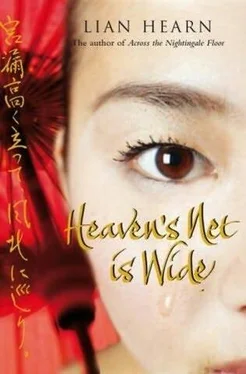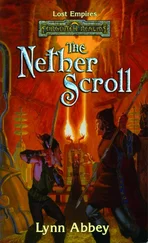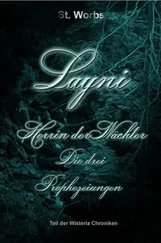There was no exchange of words, no challenge or declaration, just the immediate grappling in battle. They were equal in numbers. The Tohan had the advantage of the slope, but the Otori were mounted, could withdraw and attack with speed, and in the end the horsemen prevailed. Shigeru killed at least five men himself, wondering as he did so why he should end the lives of men whose names he did not know, and what fate had led them to his sword, late in the afternoon of the fifth month. None asked for mercy when the outcome became clear, though the last few remaining alive threw down their swords and tried to run through the shallow water, stumbling and slipping, until the pursuing horsemen brought them down, and their blood drifted across the sky’s peaceful reflection in the fields’ mirror.
Shigeru dismounted and tethered Karasu to the maple. Ordering some of the men to gather the bodies and take the heads, he called to Kiyoshige to come with him and began to climb the steps, sword still in his hand, alert to every sound.
After the clashing and screaming of the short battle, the hillside’s usual sounds were returning. A thrush was calling from the bushes, and wood pigeons cooed in the huge oaks. Cicadas droned plaintively, but beneath all these everyday noises, beneath the rustle of leaves in the breeze, something else could be heard-a dull moaning, hardly human.
“Where’s the man we brought?” Shigeru asked, stopping on the step and turning to look back.
Kiyoshige called to Harada and the soldier came running. The tortured man had been removed from his back, but his clothes and armor, even the skin of his neck, were soaked in his blood.
“Lord Shigeru, he died during the battle. We laid him down out of harm’s way, and when we returned, his life had left him.”
“He was very brave,” Kiyoshige murmured. “When we find out who he was, we will bury him with honor.”
“He will surely be reborn as a warrior,” Harada said.
Shigeru did not reply but went on up the steps to discover who it was the man had sought so desperately to help.
Just as the sound had been hardly human, so the bodies that hung from the trees were barely recognizable as men and women-and, he saw with a searing mixture of disgust and pity, children. They hung head down, slowly circling in the smoke of the fires lit below them, the skin swollen and roasted, eyes bulging from reddened sockets, pouring useless tears that the heat dried instantly. He was ashamed of their suffering, that they could be treated worse than beasts, that such humiliation and pain could be inflicted on them and they still remained human. He thought with a strange longing of the swift and merciful death brought by the sword and prayed that such a death would be his.
“Cut them down,” he said. “We will see if any can be saved.”
There were fifteen in all-seven men, four women, and four children. Three of the children and all the women were already dead. The fourth child, a boy, died immediately when they lifted him down, as the blood flowed back into his body. Five men still lived, two because their skulls had been opened to stop the brain swelling. One of these had had his tongue torn out and died from loss of blood, but the other could speak and was still conscious. Once he had been strong and agile. His muscles stood out like cords. Shigeru could see in his eyes the same gleam of intelligence and strength of will as he had seen in their rescuer. He was determined this man should live, that the other man’s fortitude should not have been in vain. The remaining three were so near death it seemed kindest to give them water and end their suffering, and Kiyoshige did so with his knife, while the conscious man knelt with joined hands and spoke a prayer that Shigeru had never heard before.
“These are Hidden,” Irie said behind him. “That is the prayer they use at the moment of death.”
When the dead were buried, while it was still light, Shigeru went with Irie to the top of the hill where the Tohan heads were laid out before the entrance to the shrine. The place was deserted, but signs of their enemies’ encampment were still evident-stores of food, rice and vegetables, cooking utensils, weapons, ropes, and other more sinister instruments. He gazed impassively on the dead, while Irie named those he recognized from their features or from the crests taken from their clothes and armor.
Two were, surprisingly to Shigeru, warriors of high rank: one, Maeda, closely related to the Iida family through marriage, the other, Honda. He wondered why such men should defile their reputation and honor by participating in torture. Had they been acting on Iida Sadayoshi’s orders? And what were the Hidden that they aroused this vindictiveness and cruelty? His mood was somber as he descended the steps again. He did not want to sleep near the shrine, tainted as it was with torture and death, and he sent Harada and some other men to look for alternative shelter. The one survivor of the atrocity was being looked after in the shade of a camphor laurel that grew on the bank. Shigeru went to him; fireflies were beginning to glitter in the blueness of twilight.
His face and head had been washed, and salve applied to the burns. The slashes in the skull oozed dark blood but looked clean. He was conscious, eyes open, staring upward at the dark shade of the tree, where the leaves were rustling slightly in the evening breeze.
Shigeru knelt beside him and spoke quietly.
“I hope your pain has been eased.”
The man’s head turned toward his voice. “Lord Otori.”
“I am sorry we could not save the others.”
“They are all dead, then?”
“Their suffering is over.”
The man said nothing for a moment. His eyes were already glistening and reddened. It was impossible to tell if he wept or not. He whispered something Shigeru could not quite hear, something about Heaven. Then he said more clearly, “We will all meet again.”
“What is your name?” Shigeru asked. “Do you have any other family?”
“Nesutoro,” he replied. The name was unfamiliar: Shigeru could not recall ever hearing it before.
“And the man who came to us?”
“Tomasu. Is he already dead too?”
“He had great courage.” It was the only consolation Shigeru could give.
“They all had courage,” Nesutoro replied. “Not one recanted; not one denied the Secret One. Now they sit at his feet in Paradise, in the land of the blessed.” He spoke in gasps, his voice rasping. “Last night the Tohan lit a great fire in front of the shrine. They taunted us, saying, ‘See where the light bursts forth in the east. Your god is coming to save you!’ ” Tears begin to well in his eyes then. “We believed it. We thought he would see our suffering and our fortitude and come for us. And we were not wholly wrong, for he sent you.”
“Too late, I’m afraid.”
“God’s ways are not for us to question. Lord Otori, you saved my life. I would offer it to you, but it already belongs to him.”
There was something in the way he said it, an attempt at humor that raised Shigeru’s spirits, almost comforted him. He felt an instinctive regard for this man, a recognition of his intelligence and character. At the same time the words bothered him. He did not fully understand the man’s meaning.
It was nearly dark by the time Harada returned, his men carrying torches that flamed and smoked, hastening nightfall. The village from which the Hidden had been taken lay a short distance away. Some of its buildings still offered shelter, though most had been destroyed during the Tohan attack. Many of its inhabitants had escaped, run away and hidden; they returned when they saw the Otori crest. A rough stretcher was made for the injured man, and two men carried him on foot while the rest rode, leading their horses and three others whose masters had died during the clash with the Tohan. A narrow stony track led from the hill along the side of the cultivated fields, following the course of the stream. The water babbled and sparkled in the torchlight; frogs were croaking among the reeds. The summer evening air was soft and caressing, but Shigeru’s mood was dark as they approached the village, and the sight of the destruction there angered him still more deeply. The Tohan had crossed the border and come deep into Otori land. They had tortured people who, whatever their beliefs, were Otori, and who had been unprotected by their own clan. He regretted that he had not acted earlier, that these attacks had not been punished before. If the Otori had not appeared so weak and indecisive, the Tohan would never have grown so bold. He knew he had been right to come, right to engage in the brief battle, but at the same time he was aware that the deaths of the Tohan warriors, especially those of Honda and Maeda, would enrage the Iida family and worsen relations between the two clans.
Читать дальше












